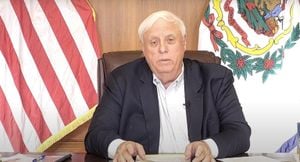Mexican officials are bracing for potential trade turbulence as rising tensions between the U.S. and Canada threaten to disrupt the delicate balance dictated by the U.S.-Mexico-Canada Agreement (USMCA). Concerns have been amplified by allegations surrounding the influx of Chinese auto parts and products being funneled through Mexico, jeopardizing the country’s position within the agreement. President Claudia Sheinbaum recently announced plans to minimize reliance on Chinese imports, emphasizing Mexico's commitment to supporting local production and maintaining compliance with USMCA stipulations.
The USMCA, which came to fruition under then-president Donald Trump’s administration in 2020, was positioned as the successor to the North American Free Trade Agreement (NAFTA). This new deal was intended to fortify regional trade, requiring greater percentages of vehicle parts be manufactured within the nations involved—an increase of 13% from earlier regulations. The agreement aimed to bolster the local automotive market by creating jobs and promoting competitive pricing.
Mexico’s fears have intensified as Trump reclaims the spotlight in the political arena, pursuing elevated tariffs on imports—a core tenet of his campaign for the 2024 presidential election. He has proposed implementing a 10% general tariff on all products entering the U.S., igniting alarms for Mexican leaders who worry about trade repercussions. Simultaneously, Canadian Prime Minister Justin Trudeau faces political unrest domestically, as some members of his own party are nudging him to step aside before the next election—a situation complicates Mexico's standing.
Sheinbaum took to the public stage to declare quite adamantly, “We have a plan with the aim of substituting these imports…either with Mexican companies or primarily North American companies.” This statement underlines Mexico’s proactive stance amid fears of losing trade advantages, hoping to redirect sourcing and production internally. This initiative recalls the global supply chain crisis of 2021 when widespread factory halts left many regions struggling with parts shortages.
Despite these efforts, obstacles remain. For example, initiatives to bolster domestically produced semiconductors have not gained significant momentum, even with massive subsidies aimed at attracting investment. Economic Secretary Marcelo Ebrard revealed forthcoming plans to start producing microchips domestically by 2024, adding, “Of course, they're not yet the most advanced chips, but we are going to start producing them here.”
The shifting trade narrative has triggered reactions across borders. Mexican officials argue they are importing fewer Chinese parts compared to their American counterparts, asserting their commitment to fulfilling trade obligations under the USMCA. Recent government moves have spotlighted efforts to dismantle regulatory bodies established by predecessors—changes meant to align Mexico’s regulations more closely with those of the U.S. Ebrard noted, “What is being done is to create reform so it’s almost exactly equal to what exists in the United States.”
Looking toward the future, Mexico aims to protect its position in the USMCA as the upcoming review period draws near. Discussions and assessments of the agreement will occur by 2026, and leaders are already speculating on the possible outcomes. Economist Gabriela Siller from Banco Base cautioned about the potential for heightened scrutiny, asserting, “If one country is dissatisfied with the trade agreement…they can ask for review each year to work out solutions.”
While formal withdrawal from the trade accord appears improbable, experts warn it will take adept navigation of political and economic landscapes to maintain its integrity. During discussions at the Baker Institute, former trade official C.J. Mahoney suggested, “I think they will play hardball with Mexico in the 2026 review,” referring to the likelihood of significant demands being placed on Mexico’s trade parameters.
Professors and economic analysts are weighing the long-term consequences of reduced reliance on Chinese imports. José María Ramos from Colegio de la Frontera Norte pointed out, “Reducing dependence on Chinese imports is not going to be achieved in the short or medium term,” highlighting the complex nature of altering long-established supply chains and manufacturing practices. Leaders are, nevertheless, facing rising pressure to establish baselines for cannabis products from neighboring countries; Mexico’s strategies will be continuously examined as key players assess the situation.
Despite the undercurrents of uncertainty, Mexico is doing what it can to hold onto the benefits it reaped under the USMCA. This trade deal allowed automakers to shift production southward, tapping lower labor costs and bolstered supply chains. Still, fears about the allegations of Chinese components entering through Mexico add new wrinkles to the trade narrative, particularly amid American concerns about domestic employment and factory productivity.
The interwoven fates of Mexico, Canada, and the U.S. underline the urgency to reinforce manufacturing circles and trade routes as geopolitical tensions ebb and flow. Mexican officials remain determined to place their nation at the forefront of North American manufacturing, all the more necessary as the future of USMCA hangs delicately between partnership and skepticism.



